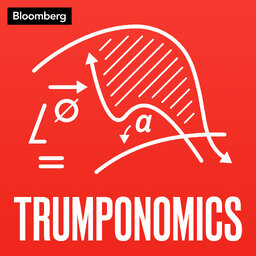Why GDP Is a Dumb Way to Measure Economic Output
G, a D and a P. Three letters, lots of trouble. Gross Domestic Product is the world's most common way to measure the value of all goods and services produced in an economy. But does it really deserve its pedestal? Lorenzo Fioramonti, a professor at the University of Pretoria, tells Dan and Scott that the acronym should actually stand for "Gross Dumb Product." He argues that it's responsible for all manner of sins, ranging from the pillaging of a South Pacific island to an instrument used by austerity-craven northern Europeans to hammer Greece. Time for a revolution, Fioramonti insists. Just make sure investors don't crucify you.
 Trumponomics
Trumponomics


